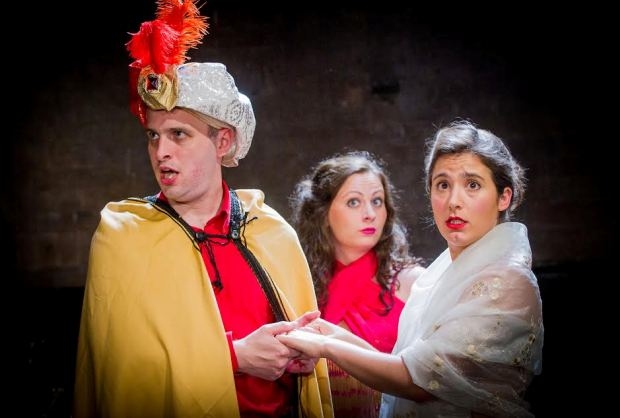Gariné (Arcola Theatre)

© Robert Workman
Here’s a how-de-do. On paper this semi-staged production of Dikran Tchouhadjian’s 1875 opera Leblebidji Hor Hor Aga (here renamed after its main character) was the pick of this year’s Grimeborn festival, but in practice it managed to rack up more disappointments than a eunuch in a seraglio.
Armen’s dream of launching Constantinople’s grand new theatre is almost scuppered when his leading lady defects on opening night. Enter Gariné, an ingénue who can deliver the goods (and with whom Armen falls in love at first sight) but whose curmudgeonly father, a wealthy chickpea merchant, has no truck with the gutter theatrical. Will art triumph over trade and true love run its course? Bets are off.
In car-crash evenings it’s always best to reflect on the positives, and within the 14-strong ensemble a handful of decent performances stood out. Katie Grosset, Giles Davies and Roger Paterson all transcended the prevailing mediocrity through their singing and stagecraft, while Danae Eleni delivered the title role with winning conviction despite the fragility of her lightly supported soprano. The star turns, though, were the sparkling pianism of musical director Kelvin Thomson, clearly an energising force across the production, and Geoff Hense‘s shrewdly moody lighting.
It’s interesting to discover a little-known composer from somewhere as unexpected as Turkey, and Tchouhadjian certainly had a way with a tune. But for Grimeborn to tout him as ‘the Armenian Verdi’ and ‘the Oriental Offenbach’ is asking for trouble. At its best (which by its own modest standards isn’t bad) his score is closer to minor Sullivan minus Gilbert.
This reclamation of Gariné is the brainchild of the Armenian-Egyptian polymath Gerald Papasian, who not only directs but also narrates the evening and is responsible for a translation that shows why lyric writers should stick to their mother tongue. Weak syllables set to strong notes are the least of its problems amid couplets of the "If you don’t stop / I’ll blow my top" variety. And there are two and three quarter hours of it.
Papasian calls this a ‘semi-staged’ version in order to excuse commendable cuts to an overlong evening; but also to legitimise what in truth is an under-directed full production. He's schooled his hapless cast in a welter of mugging, gurning, custard pie throwing and false moustache wearing that smacks of third-rate theatre-in-education for early years.
One or two singers had the good grace to look thoroughly embarrassed by the whole thing, though not the young bass who, distractingly, spent the entire evening twitching a recalcitrant floppy fringe out of his eyes. Like the show itself, he could have done with a trim.










